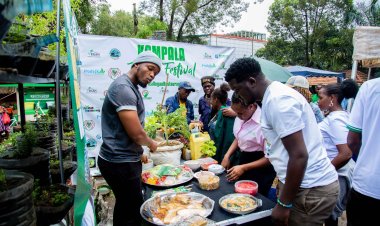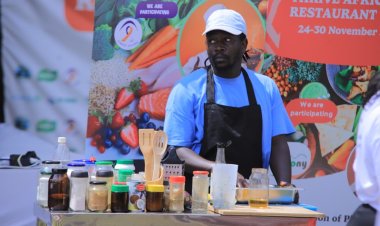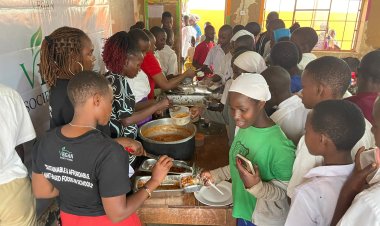Government policy on compulsory consumption of dairy milk among school children unhealthy , here is why?
A recent study, published in the British Medical Journal, examined milk intake and its relationship to risk of bone fractures, death from “any cause,” and death from cardiovascular disease and cancer yet plant Milk contains lower in fat and calories compared to one cup of whole-fat cow's milk, most plant-based milks have 37% to 75% less fat. Many varieties of non-dairy milk, including almond, rice, coconut, hemp and cashew milk, are lower in calories than dairy milk.
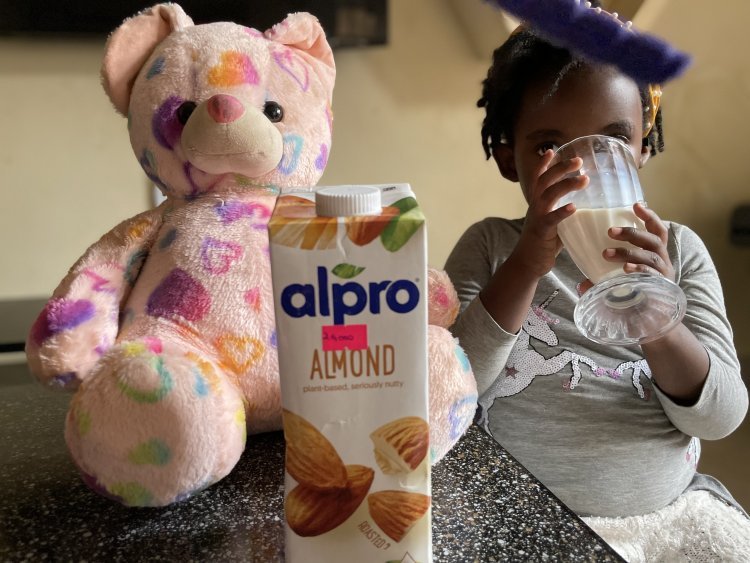
Milk proteins, milk sugar, fat, and saturated fat in dairy products pose health risks and encourage the development of obesity, diabetes, and heart disease according to Center for Nutrition studies.
A recent study, published in the British Medical Journal, examined dairy milk intake and its relationship to risk of bone fractures, death from “any cause,” and death from cardiovascular disease and cancer in a large group of Swedish men and women. Contrary to what you might expect, among middle-aged and older women, each additional glass of milk consumed daily was associated with a 9 percent increased risk of hip fracture and a 15 percent increased risk of death from any cause.
Adding an extra glass of dairy milk was also associated with a 15 percent increased risk of death from heart disease.
This is why when most older persons (aged 80 and above) would never get up one they fell.
Since they were a kids, they were told that dairy milk was helping with their bone density when, in fact, the opposite was taking place.This is an excerpt from The Smart Parent’s Guide to Raising Vegan Kids (July 2018, Skyhorse Publishing) by vegan blogger and former meat-eater Eric C. Lindstrom.
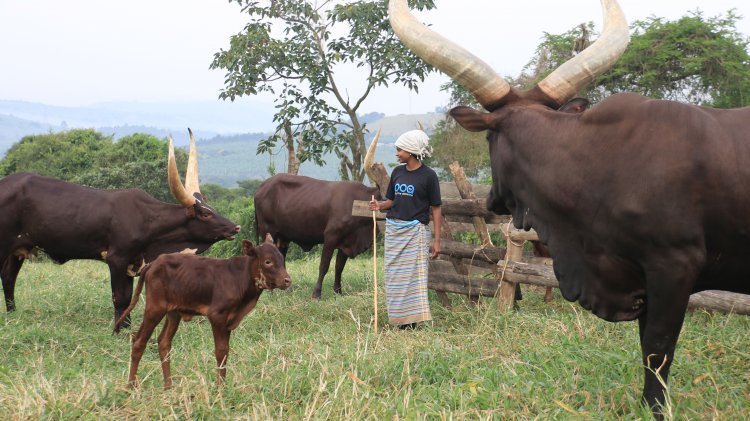
Its quite unfortunate that with several studies available, Government of Uganda plans to force parents to buy dairy milk for children.
In September this year, Ugandan government directed all schools to provide school going children with dairy milk daily , additionally, already burdened parents will have to dig deeper in their pockets to pay for this milk, their goal is to ensure each learn consumes atleast ½ a litre payday.
It should be noted that the annual consumption of dairy milk in Uganda is 2.5 billion in litres, this additionally translates into animal cruelty for calves are often denied an opportunity to feed because humans need their milk.
What about the hgygiene? A 2017 publication by National Library of medicine dairy milk Hygiene higlighted a concern in western Uganda where there was prevalence of Mastitis and Antimicrobial Resistance Profiles of Bacterial Contaminants of Milk and Milk Products, sadly government has launched deliberate programs to improve milk production in this region despite the hygiene concerns.
It should be noted that increased dairy milk consumption is also linked to prevailing non communicable disease in Uganda like Gout, heart disease, type 2 diabetes, and Alzheimer's disease.
Additionally promoting increased consumption milk directly translates into increased animal agriculture that calls for the need to adopt intensive animal husbandry practices and supplementary feeding technologies to guarantee proper feeding, nutrition, and faster growth.
This increased production is coming with problems like competition for land, feed and water resources and in many rural communities humans and cattle share water from the same pond, this is often contaminated water.
It should also be noted that Uganda has over 14.2 million cattle, 16 million goats, 4.5 million sheep and 47.6 million poultry, 4.1 million pigs all raised for human consumption thus exposed to cruelty .
Government’s priority now is advocating for increased consumption of animals and animal products that will in the long run increase cruelty towards animals, especially those raised for meat and milk.
"This is evidence that there is a knowledge gap on the disadvantages of animal agriculture including competition for resources with humans, Climate Change, Diseases and environmental degradation etc, and as Uganda Vegan Society we have a mandate to fill this gap through mass education and engaging government on why it's important to reduce animal agriculture and also put an end to school dairy milk policy that's recently been passed" Nabaasa Innocent, Executive Director Uganda vegan Society said

Sapphire plant milk is available in Uganda
On a good note there is improved acceptability of plant milk in Uganda, we have witnessed these at our annual events like the Vegfest and Vegan Restaurant week.
Also there are several suppliers of plant milks in Uganda and easys to find on the major supermarket shelves.
'We call upon government to consider plant milk for chidlren, Soya bean is wildly grown in Uganda, if government opted to invest in production of soy milk, this would be affordable, accessible and also has an economic benefit to farmers' Nabaasa added
'Through the annual vegan restaurant week, our focus is to ensure there is increased access to tasty and affordable plant options and as increased knowledge on the role of plant based meals to especially human health' she added
'The Vegan Restaurant is a showcase of these meals and restaurants/ markets where these meals can be accessed on a daily basis'.
The restaurant week brings together over 500 revellers with over 50 participating and upto 100 different types of Vegan foods and products in an atmosphere of celebration and education aimed at introducing Veganism to Ugandans and in the long run encourage charities that improve the lives of people, animals and the environment.
About Uganda Vegan Society work
-
VEGAN EDUCATION
This focuses on Animal advocacy and welfare campaigns aimed at protecting animals from all forms of cruelty through promotion of plant based diets, a strategy that will reduce the demand for increased animal farming.
Our current project ‘Free the Hen’ aims to end the abuse of hens through cage farming that limits their inability to practice natural behaviours like nesting, exercising and dust bathing but are subjected to high levels of stress and frustration while in cages resulting in a higher incidence of metabolic disorders and severe frustration.
We do this through encouraging Ugandans to opt for plant based diets to reduce commercial farming of hens in cages ,a practice that’s not only good for the animals but human health and the planet. We promote animal welfare education among Chicken farms and restaurants that use caged eggs and chicken.
Additionally we work with relevant government agencies and departments to advocate for better policies and guidelines towards the improvement of the wellbeing of hens.
- DIET AND NUTRITION - Plant-based diet
Veganism is a way of living which seeks to exclude, as far as is possible and practicable, all forms of exploitation of, and cruelty to, animals for food, clothing or any other purpose and promoting a more healthier life style.A vegan diet can help to prolong life, reduce the risk of various diseases, and support exercise levels.
To realise the benefits of a plant based diet, you need two things: an action plan that gets you started, and simple recipes that keep you going. With this in mind, holistic nutritionist Heather
What is a plant-based diet?
- Limiting the consumption of animal products with an open mind to transitioning to a new lifestyle that avoids them completely.
- Eating whole foods that are minimally processed or preferably not at all.
- Focusing on eating primarily plants, vegetables, fruits, whole grains, legumes and seeds & nuts.
- Excluding refined foods like added sugars, white flour and processed oils.
- Preferring locally sourced, organic food whenever possible.
- SOCIAL AND CULTURAL COHESIO
The vegan restaurant week is a replica of Kampala restaurant week, this is a Vegan food showcase by over 40 restaurants within and outside Kampala showcasing the unique Vegan dishes on their daily menus.
The Vegan Restaurant Week is a great opportunity for Kampala’s finest restaurants to show off what they have to offer to Vegans in Uganda.
The Vegan restaurant week is part of the build up activities towards the annual Vegan Festival that is celebrated annually on 1st-November, which also doubles as world Vegan day. This experience brings together restaurant owners, Chefs, nutritionists and thousands of people in an atmosphere that brings fun dining experiences for food lovers.

 POATV Reporter
POATV Reporter 






